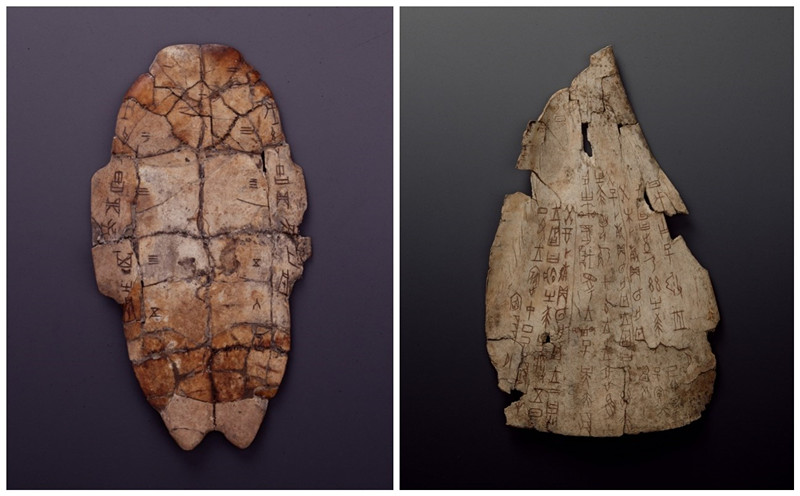(单词翻译:单击)
Written in bone
“一片甲骨天下惊”,甲骨文的意义何在?
You may never write words on an oracle bone or tortoise shell, but you might see them in a museum. They are what we call "the oracle bone scripts".
你或许从未试过在甲骨或者龟甲上写字,但你或许在博物馆里见过它们。它们正是我们所说的“甲骨文”。
To celebrate the 120th anniversary of the discovery of these scripts, the National Museum of China is running an exhibition called Zheng Gu Ze Jin. It runs through Dec 22.
为纪念甲骨文发现120周年,中国国家博物馆举办了一场名为“证古泽今”的展览,展期将持续至12月22日。
According to China Daily, the exhibition addresses the "significant meaning of the oracle bones to the past and present of an ancient, continually evolving civilization".
据《中国日报》报道,本次展览讲述了“甲骨文对于一段绵延发展的古文明从古至今的重大意义”。
The earliest confirmed evidence shows that more than 3,000 years ago, people in the late Shang Dynasty started to write characters on pieces of bone and turtle shell.
据最早被证实的迹象显示,在三千多年前的商朝末期,人们开始在一片片龟壳兽骨上写字。
The oracle bone scripts are records of divinations and prayers to the gods from people in that era. According to Song Zhenhao, one of the leading scholars of the field, "they are important materials for the re-construction of ancient Chinese history and the perspective of social life in the Shang Dynasty."
甲骨文是当时人们向神明占卜祈祷的记录。甲骨文领域著名学者宋振豪认为,“它们是重构古代中国历史和商朝社会生活视角的重要素材。”

The scripts are pictograms. They come from pictures of the objects they refer to. "The oracle bone scripts, as an earliest known and mature form of Chinese characters, present the beauty and uniqueness of a language that has been passed down consistently," said Chen Nan, a professor of Tsinghua University's Academy of Art and Design.
甲骨文属于象形文字。它们都源于所要指代物体的图画。“甲骨文是中国目前已知最古老的系统成熟的汉字,体现了一脉相承的语言之美与独特性,”清华大学美术学院教授陈楠说道。
Apart from learning the past, oracle bone scripts also have impacts on today.
除了能让人们了解历史之外,甲骨文也有着现代意义。
According to Xinhua News Agency, these artifacts contain data that include the earliest written records of both a solar eclipse and a comet.
据新华社报道,这些文物中包含了最早的日食与彗星的书写记录。
The society that produced the oracle bone scripts shared many of the characteristics that are recognized today as typically Chinese. "These valuable inscriptions from China ... demonstrate that the memory recorded in the documentary heritage is an irreplaceable way of transmitting tradition, culture and historical awareness," Marielza Oliveira, director of UNESCO's Beijing office, told China Daily.
在当时所创造的甲骨文中能看到如今不少汉字的影子。“中国这些珍贵的刻字……体现了记录于文献遗产的记忆是传承传统、文化和历史意识的一种不可替代的方式,”联合国教科文组织驻华代表处主任欧敏行在接受《中国日报》采访时如此表示。
The scripts are evidence of ancient Chinese culture but also have an "important influence" on modern Chinese values, Zhao Yong, the exhibition's chief curator, told China Daily.
甲骨文是古代中华文化的证明,但同时也对中国现代价值观产生了“重大影响”,该展览策展人赵永在接受《中国日报》采访时如此表示。


